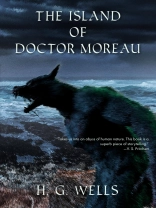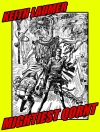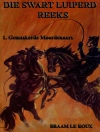The Island of Doctor Moreau is a classic work of early science fiction and one of H. G. Wells’ most visionary novels. It recounts the harrowing ordeal of Edward Prendick, an Englishman who survives a shipwreck in the southern Pacific Ocean. Rescued by a man named Montgomery, Prendick finds himself on an island belonging to Dr. Moreau, formerly an eminent physiologist in London who was expelled from his homeland for his cruel vivisection experiments.
Prendick discovers that Moreau has been creating hideous hybrids of beasts and man in the name of science with an unnerving, sinister disregard for the anguish of his test subjects. Fearing for his life, Prendick flees into the jungle where he joins a colony of half-human/half-animal creatures while he undertakes efforts to escape. Meantime, the true consequences of Moreau’s experiments emerge and Prendick is imperiled by forces he can barely comprehend, let alone control. This gruesome tale, as haunting as it is enduring, brilliantly anticipates questions that persist today-what limits, if any, should be imposed in the pursue of science and at what price?
This Warbler Classics edition includes an image gallery of animal species that feature in the story and a detailed biographical timeline.
Mục lục
Contents
Introduction
I In the Dinghy of the Lady Vain
II The Man Who Was Going Nowhere
III The Strange Face
IV At the Schooner’s Rail
V The Landing on the Island
VI The Evil-Looking Boatmen
VII The Locked Door
VIII The Crying of the Puma
IX The Thing in the Forest
X The Crying of the Man
XI The Hunting of the Man
XII The Sayers of the Law
XIII A Parley
XIV Doctor Moreau Explains
XV Concerning the Beast Folk
XVI How the Beast Folk Tasted Blood
XVII A Catastrophe
XVIII The Finding of Moreau
XIX Montgomery’s ‘Bank Holiday’
XX Alone with the Beast Folk
XXI The Reversion of the Beast Folk
XXII The Man Alone
Image Gallery of Featured Species
Biographical Timeline
Giới thiệu về tác giả
H. G. Wells (1866-1946) was an English writer of novels, short stories, history, social criticism, satire, biography, and autobiography. With Jules Verne, he is considered the ‘father of science fiction.’ He envisioned such things as time travel, alien invasion, invisibility, biological engineering, and cosmic threats long before they existed or were conceived of by others. In addition to enjoying popular success, Wells was nominated for the Nobel Prize in Literature four times. He died in London, England, on August 13, 1946 at the age of seventy-nine.












